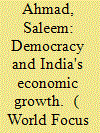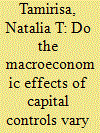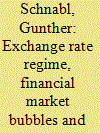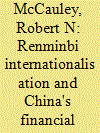| Srl | Item |
| 1 |
ID:
133450


|
|
|
|
|
| Publication |
2014.
|
| Summary/Abstract |
A firmly rooted democracy, a shared commitment to economic growth and national capitalism, and fairly rapid development are key features of India's new political economy. This, however, is not the full picture. Before the liberalization process, India's economic growth has been accompanied by growing inequalities among people. The gains for the poor have also been only modest.
|
|
|
|
|
|
|
|
|
|
|
|
|
|
|
|
| 2 |
ID:
073330


|
|
|
|
|
| Publication |
2006.
|
| Summary/Abstract |
This paper examines how the macroeconomic effects of capital controls vary by type, depending on which international financial transactions they cover. Analysis draws on the experience of Malaysia, a country that used a gamut of permanent and temporary capital controls over the past decade. In an error-correction model, we find that controls on portfolio inflows, and restrictions on bank, foreign exchange, and stock market operations helped drive a wedge between domestic and international interest rates. This finding is robust to alternative specifications of the model and alternative measures of capital controls. Controls on portfolio outflows and international transactions in the Malaysian ringgit do not appear to have been instrumental in providing more monetary independence to the authorities.
|
|
|
|
|
|
|
|
|
|
|
|
|
|
|
|
| 3 |
ID:
074184


|
|
|
|
|
| Publication |
2006.
|
| Summary/Abstract |
This paper examines the effectiveness of China's monetary policy in curbing the overheating and speculation problems under the current foreign exchange system. The paper stresses the necessity of capital controls in China's gradual foreign exchange reform and the importance of credible government policy in guiding market expectations. Also, the paper discusses the persistence of China's external imbalance, and provides policy recommendations for its reduction.
|
|
|
|
|
|
|
|
|
|
|
|
|
|
|
|
| 4 |
ID:
152507


|
|
|
|
|
| Summary/Abstract |
Since 2014, capital inflows into China have turned into capital outflows, reversing the gradual appreciation path of the renminbi against the US dollar into an erratic depreciation path. The paper explains the current capital outflows by comparing China and Japan with respect to the impact of exchange rate expectations on speculative capital flows. It is argued that both in China and Japan, given benign liquidity conditions in the USA, policy-induced appreciation expectations have generated capital inflows that have contributed to overinvestment and financial market bubbles. The current reversal of capital flows is seen as a signal that the bubble in China has burst. To stabilize growth in China and to discourage speculative capital outflows a fixed exchange rate to the dollar is recommended. Given Japan's experience and given that China's foreign assets remain high, the depreciation pressure on the Chinese renminbi can be expected to abate.
|
|
|
|
|
|
|
|
|
|
|
|
|
|
|
|
| 5 |
ID:
185556


|
|
|
|
|
| Summary/Abstract |
This paper examines the political-economy of capital controls in China. We argue that the global policy context influences domestic political debates over capital controls, which, in turn, can shape public attitudes toward the subject. Policy entrepreneurs on each side of the capital controls debate can point to capital account policies in other countries as evidence for the desirability of their position. This issue framing strategy, in turn, influences domestic preferences on capital controls. We present qualitative evidence showing that the international policy context features heavily in domestic political debates about capital controls in China. Next, using original survey data, we show that information about other countries’ policy choices influences mass public attitudes about capital controls in China. The evidence indicates that growing global use of capital controls can strengthen public support for this policy. More broadly, these findings suggest that a complete understanding of policy diffusion requires greater attention to the role played by domestic policy entrepreneurs.
|
|
|
|
|
|
|
|
|
|
|
|
|
|
|
|
| 6 |
ID:
074957


|
|
|
|
|
| Publication |
2006.
|
| Summary/Abstract |
Malaysia did not turn to the International Monetary Fund for assistance when pressure from the 1997-1998 East Asian financial crisis hit the country. The country was less vulnerable than its neighbors, not least because it had earlier imposed limits on foreign borrowing and prudential regulations and supervision of the banking sector. Although Malaysia's pathway through the 1997-1998 crisis included an orthodox adjustment program of the type the IMF would have required, this program was soon reversed in favor of reflationary monetary policies and the imposition of a short-term capital control regime. These responses took place against a backdrop of political intrigue and drama, but they reflected an underlying pragmatism and recent history of using capital controls and of not turning to the IMF.
|
|
|
|
|
|
|
|
|
|
|
|
|
|
|
|
| 7 |
ID:
120839


|
|
|
|
|
| Publication |
2013.
|
| Summary/Abstract |
There is a widespread view that China's currency can be used in international markets only after the liberalisation of China's domestic financial markets and the opening of its capital account. Yet evidently the renminbi's internationalisation is preceding these so-called preconditions. This article assesses the tensions inherent in renminbi internationalisation starting at a transitional period in China's financial development. For now, effective capital controls allow the Chinese authorities to retain regulated deposit and lending rates, quantitative credit guidance and bond market rationing. Relaxation of the capital controls would put these policies at risk. Reserve requirements can be extended to bank inflows from the offshore market but only at a price.
|
|
|
|
|
|
|
|
|
|
|
|
|
|
|
|